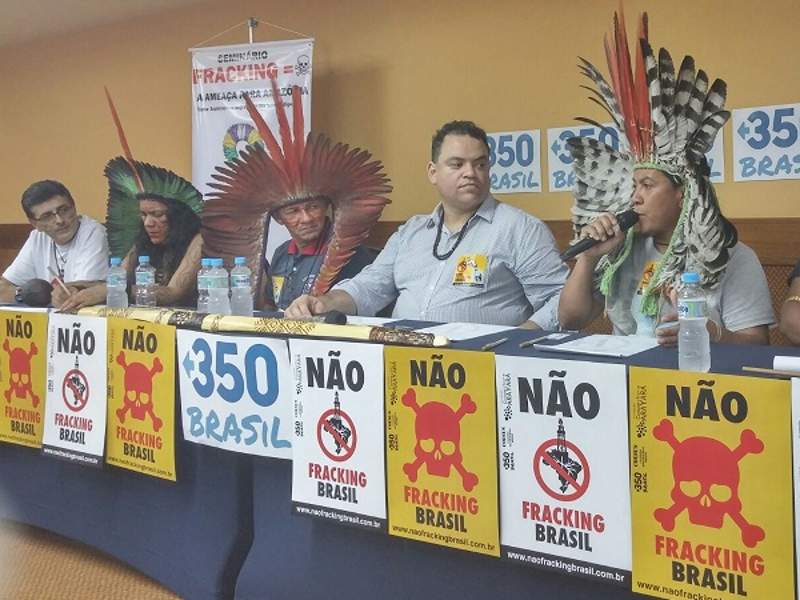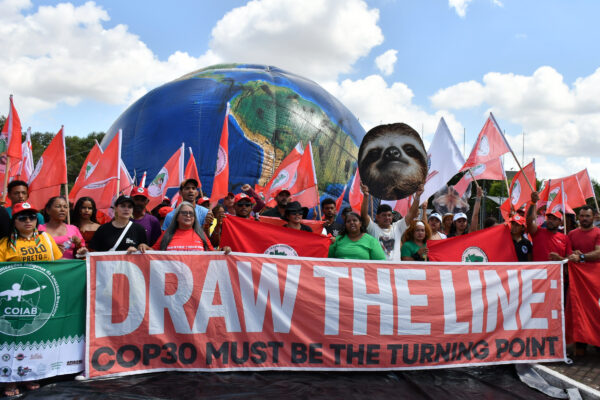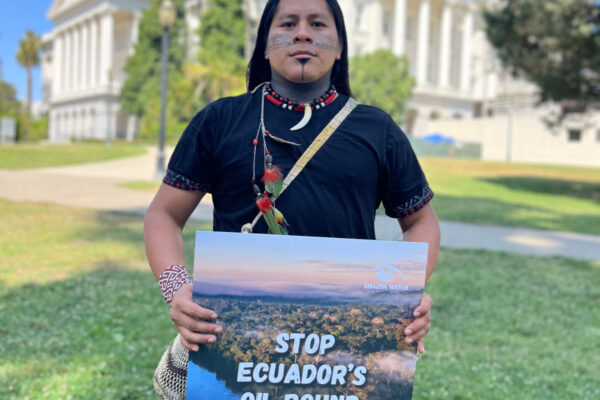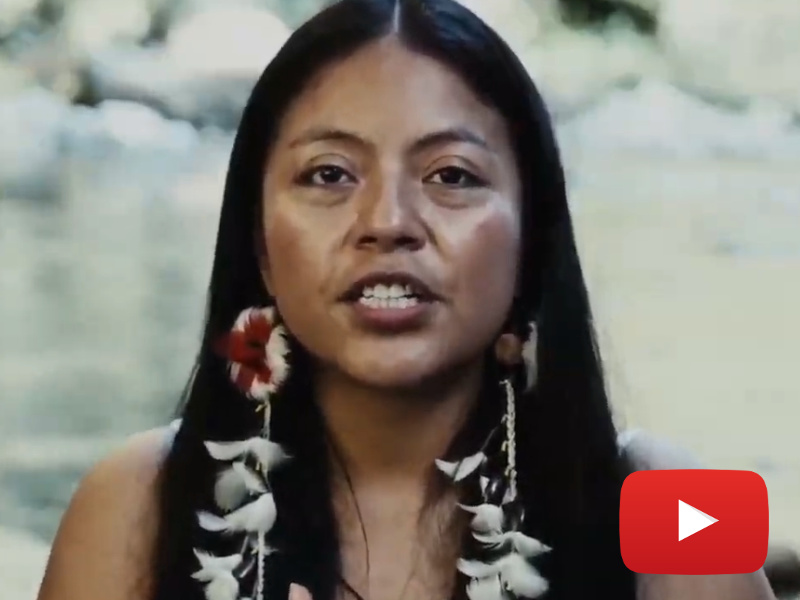
In an act of defiance targeting the Brazilian Oil and Gas Agency (ANP), Brazilian indigenous leaders and activists interrupted a major auction of new fracking concessions set to spread across the Amazon rainforest. Holding up signs calling for “No Brazil Fracking” (Não Fracking Brasil), activists seized the spotlight to demand indigenous rights and divestment from dirty energy, briefly halting the 13th round of bidding for fracking exploration rights at the ANP on October 7th in Rio de Janeiro.
As a result of the protest as well as low interest among investors, the ANP’s effort to auction 266 fracking blocs failed, with only 37 blocks (14%) sold to small companies. This failure was emphasized by the absence of major international companies such as BP, ExxonMobil, Shell and Statoil, which were among the 36 registered bidders at the event.
The Brazilian No Fracking Coalition (Coalizão Não Fracking Brasil – COESUS) – a movement formed to fight the decision of the Brazilian government on fracking – along with nine indigenous leaders, helped lead the protest to reinforce the threats fracking represents to their “very existence and cultural heritage.”
The Brazilian government’s ambitious fracking plans comprise a total area of over 122,000 km2 across 12 Brazilian states and are distributed across ten sedimentary basins, including Amazonas. Several of the proposed blocs stretch across vast Amazonian territories, including protected areas and lands directly adjacent to indigenous domains. The most polemic proposed blocs would directly affect indigenous peoples living in voluntary isolation in the Javari Valley of Acre State and the Juruá Valley as well as Serra do Divisor in Amazonas state.
Effects from drilling and extracting oil and gas in the Amazon are characterized as being not only disastrous for ecosystems and biodiversity where drilling takes place, but also for the populations living in surrounding areas, as is the case with many indigenous and traditional peoples. Fracking activities have been linked to devastating environmental, social and economic effects such as water contamination, air pollution, destruction of terrestrial and aquatic fauna, soil infertility, and also to health problems such as increased risk of cancer, neurological and heart problems and birth defects.
Fracking, or hydraulic fracturing, is a water-intensive method used to produce fractures in shale rock in order to stimulate the flow of natural gas or oil. While the Brazilian government claims that fracking is safe and that the blocks on offer do not overlap with native territories nor directly affect these communities, indigenous peoples have launched a determined protest movement to bar the practice of fracking near their lands.
Mirroring COESUS’ concerns, Federal Prosecutors from Amazonas State (MPF) recommended that the APN exclude seven blocks located in the Amazon basin from the auction, given their close proximity to fifteen indigenous lands. In its recommendation, the MPF stressed that even though these blocks may not be directly overlapping with indigenous lands, some of them are located only 72 to 360 meters away from indigenous territories, portending serious socio-environmental impacts to the communities based there. Following the auction, and given the lack of bids on these seven blocks, the MPF insisted that they be excluded from future auctions.
This month’s auction also raises serious concerns about the Brazilian government’s failure to consult indigenous peoples and other threatened communities about the threats of fracking. Without informing and consulting the communities potentially affected by these activities, the government is in direct violation of its own laws and the indigenous right to free, prior, and informed consultation and consent (FPIC). The Brazilian government’s brazen posture in violating rights to open the Amazon to fracking has inspired indigenous peoples and their allies to directly challenge its intentions by organizing debates and convening experts to gather information on the potential impacts of fracking in their territories.
In Brazil, many environmental groups and activists have publicly proclaimed that they are prepared to show the Brazilian government that the local and global movement against fracking is vibrant and growing. As fracking blocks come up for auction in the Brazilian Amazon threatening indigenous peoples’ lands and key conservation areas, the future of the Amazon and the survival of its indigenous communities confronts a new menace. Yet this month’s protest at the 13th bidding round also demonstrates that threatened communities and their allies are gearing up to block future fracking plans, and that resistance will continue to grow apace with the government’s destructive intentions.
Diana Oliveira is an activist and independent researcher interested in indigenous rights and environmental and social justice.












